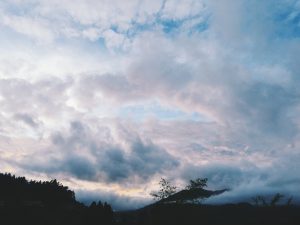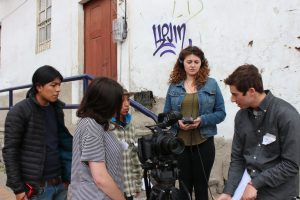First Day in Otavalo
Today, we woke up at Cabanas del Lago. A few of us decided to get up really early, and try to catch the sun rise. Unfortunately, we couldn’t see it very well from where we were standing on the dock, but the clouds looked very beautiful, and we still had a nice time taking in the fresh, crisp morning air over the lake. After breakfast, we traveled to Otavalo, where we met with the members of APAK that we will be working with for the next few days.

A little bit about APAK: the acronym stands for Asociación de Productores Audiovisuales Kichwas. The mission of the group is to bring awareness about Kichwa culture and create a sense of unity between all the people of Ecuador. Each week, the organization creates an episode about Kichwa culture (as perceived by the Kichwa people rather than other Ecuadorian people). The episodes air on five different private Ecuadorian TV stations. We got to watch one that included translations for the names of various animals from Spanish to Kichwa. It was very interesting to see the vast differences between the two languages.
After learning about the mission and goals of APAK, we discussed our upcoming documentary project. We will be focusing on a plant known as “penco” in Ecuador and “agave” in the United States. Penco is a highly sustainable and incredibly useful plant. Inside the leaves, is a sweet liquid called “tzawarmishki.” When fermented slightly “tzawarmishki” becomes a drink called “guarango”. Guarango has a very yeasty aroma and flavor, similar to that of beer. Aside from its uses as a food and drink, penco contains fibers known as “cabullo,” which have a rough texture and secrete a liquid when pressed hard enough. Thus, “cabullo” makes an excellent substitute for a sponge. Essentially, our teams are examining three different areas of penco’s impact in a town known as Cayambe.
The first group will be focusing on the environmental impact of penco. The plant is known to have very positive effects on soil growth and nutrient content. Our doucmentarians will be taking a closer look at the process of how penco is produced and how exactly it can benefit the land.
The second group will be investigating the political and social impact of penco. This team will be interviewing various public officials in Cayambe to receive their opinion on the production of penco. The group will also be conducting random interviews on the street to find out how much the public knows about penco.
Finally, the third group will be examining the production of penco from a cultural angle. They will have the opportunity to interview the women who have been laborers for the penco industry for many, many years. Interestingly, only women do this type of work.

Overall, today was jam-packed with valuable information about APAK, the amazing work they do, and the great opportunity we have to become involved in this project. We are all so excited to see what lies ahead this week!!